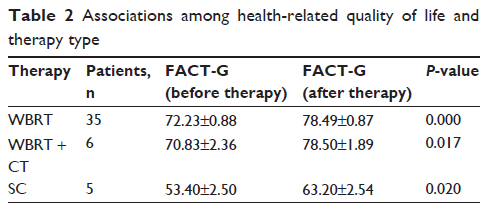109669
论文已发表
注册即可获取德孚的最新动态
IF 收录期刊
- 3.4 Breast Cancer (Dove Med Press)
- 3.2 Clin Epidemiol
- 2.6 Cancer Manag Res
- 2.9 Infect Drug Resist
- 3.7 Clin Interv Aging
- 5.1 Drug Des Dev Ther
- 3.1 Int J Chronic Obstr
- 6.6 Int J Nanomed
- 2.6 Int J Women's Health
- 2.9 Neuropsych Dis Treat
- 2.8 OncoTargets Ther
- 2.0 Patient Prefer Adher
- 2.2 Ther Clin Risk Manag
- 2.5 J Pain Res
- 3.0 Diabet Metab Synd Ob
- 3.2 Psychol Res Behav Ma
- 3.4 Nat Sci Sleep
- 1.8 Pharmgenomics Pers Med
- 2.0 Risk Manag Healthc Policy
- 4.1 J Inflamm Res
- 2.0 Int J Gen Med
- 3.4 J Hepatocell Carcinoma
- 3.0 J Asthma Allergy
- 2.2 Clin Cosmet Investig Dermatol
- 2.4 J Multidiscip Healthc

癌症脑转移患者的姑息性全脑放疗和与健康相关的生活质量
Authors Gao Y, Gao F, Ma JL, Zhao DL
Received 22 April 2015
Accepted for publication 30 June 2015
Published 21 August 2015 Volume 2015:11 Pages 2185—2190
DOI http://dx.doi.org/10.2147/NDT.S87109
Checked for plagiarism Yes
Review by Single-blind
Peer reviewers approved by Dr Xiang Mou
Peer reviewer comments 3
Editor who approved publication: Professor Wai Kwong Tang
Objective: To assess the use of palliative whole-brain radiotherapy (WBRT) in the treatment of brain metastases (BMs) and to evaluate the health-related quality of life (HRQOL) of these patients.
Materials and methods: We conducted a retrospective study of 46 patients with BMs who were treated with WBRT at the First Affiliated Hospital of Xi’an Jiaotong University between January 2013 and January 2015. External beam radiotherapy techniques were used to deliver 40 Gy in 20 fractions or 30 Gy in ten fractions with a 10 MV photon beam from a linear accelerator to the whole brain. Data were stored and analyzed using SPSS version 17.0.
Results: Of the 46 patients, the survival time of patients in our study was 10.8±0.55 months: 11.8±0.46 months in patients with WBRT, 11.75±1.00 in patients with WBRT + chemotherapy, and 3±0.79 months in patients with supportive care, respectively (P <0.01). The HRQOL scores of all the patients were 70±1.16 (before therapy) and 76.83±1.04 (after therapy) (P <0.01). The HRQOL scores of the patients with WBRT were 72.23±0.88 (before therapy) and 78.49±0.87 (after therapy) (P <0.01). There was no central nervous system toxicity; only two (4.3%) patients were found to have BM hemorrhage. Radiation necrosis happened in one patient (2.2%).
Conclusion: Effective treatment options for patients with BMs are important. WBRT was evaluated to ensure survival outcomes and QOL were enhanced after therapy for patients with BMs.
Keywords: brain metastases, whole-brain radiotherapy, health-related quality of life
